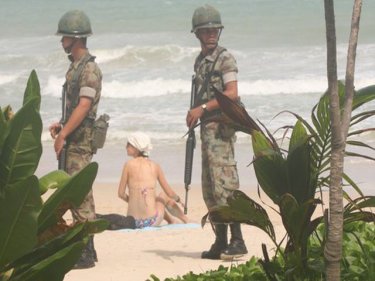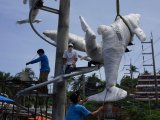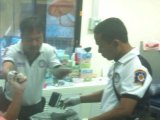PHUKET: There were two umbrella revolutions in 2014. In the first, the people of Hong Kong rose up against China and communism and demanded a small slice of democracy.
In the second, the non-democratic military authorities in Thailand suppressed capitalist radicals by clearing thousands of umbrellas from the beaches of Phuket, along with the sunbeds beneath them.
Sadly, Hong Kong's umbrella revolution has sputtered to a halt. Surprisingly, Phuket's umbrella revolution is still being fought.
It's a long way from the sands of Iwo Jima to the sands of Patong beach - and the winner of the holiday island's umbrella war has yet to plant a victory flag.
Nevertheless, we believe we've seen enough action to declare Phuket's beach clearances the Phuketwan Innovation of the Year, the first of this year's annual award winners.
As this was the military, the strike along the beaches probably came predawn and without warning. By the time the vendors of Surin, Kamala and Patong realised what was happening, they were well and truly furled.
The accounting principle is not difficult to understand: the beaches are public space.
The privateers had been making large amounts of money through tourist season after tourist season on the assumption that they, as members of the public, were entitled to use the public space to turn a profit.
Wrong.
There has yet to be an adequate explanation as to why so many small businesses had to go while one or two larger businesses were allowed to stay.
Nobody could have predicted that the coup in May would reveal the military's liking for holiday beaches to be free from sunbeds and lotus-eating layabouts.
The men in uniform may have expected all the tourists to cheer as they cleared illegal restaurants and beach clubs from the shorefronts.
Wrong. Some tourists cheered, others did not.
The intervention was timely: on some of Phuket's beaches, adventurous opportunists had already claimed public beach space as private turf and, without a war, would have made fresh fortunes.
Certainly, some of the vendors are not wealthy people.
But if Phuket's police investigators are to be believed, there are also sunbed supremacists who extorted large sums from resorts, owned substantial homes, expensive cars, and enjoyed regular family visits to Europe.
The counter-insurgency began on Phuket's beaches soon after the military decided that the local councils should be doing what they have always supposed to be doing: enforcing the law. (Large guffaws are permitted at this point in the article.)
When it comes to the beaches, Phuket's councils have never been able to enforce the law.
The military appears to imagine that, now the beaches have been cleared, the councils are suddenly going to change their habits. This leaves Phuketwan puzzled and perplexed.
Our verdict is that if the military wants to keep the beaches cleared, an independent Phuket Beach Authority should be created, with the Royal Thai Navy enforcing the regulations on public space and helping the lifeguards to protect tourists.
Navy patrols should be mounted every day at every beach. Without enforcement, the war is lost. Victory becomes defeat.
Phuket and its tourism industry is better off following the examples of neighboring provinces Krabi and Phang Nga by banning vendors, sunbeds, umbrellas, jet-skis and parasails.
The government will suffer a severe loss of face if, over the next 12 months, commerce returns to Phuket's beaches.
For now, the military are the winners of the Phuketwan Innovation of the Year 2014 award.
Previous winners of the Phuket Innovation of the Year have included the 'Safer Phuket' initiative, Thanyapura Phuket, the honorary consuls meetings, the Tin Mine Museum, the court mediation system, Ao Po Grand Marina and the Red Mountain Golf Course.
We'd present the award in person if only we weren't banned from the military HQ at the Royal Thai Navy 3 base at Cape Panwa.














Is back to the fifties a victory?
The few who agree are not the beachgoers.
Posted by Cecil on December 27, 2014 19:12